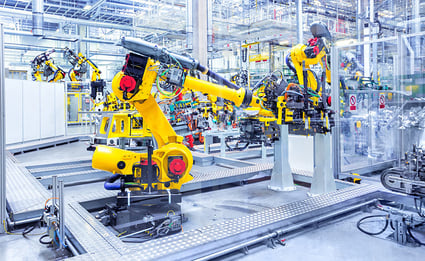Digital Solutions Give Plant Managers the Upper Hand for Optimizing Production Operations
Nancy Sarpolis - January 11, 2022

When it comes to optimizing operations in a manufacturing facility, all roads converge in the plant manager’s office. From procurement to production to quality and distribution, the plant manager is ultimately responsible for ensuring that each process within the plant works together seamlessly to meet daily metrics, organizational goals and customer demand.
The complexity and volatility of today’s supply chain is making those tasks more difficult. Raw material shortages, staffing concerns and fluctuating volumes are putting pressure on a plant manager’s ability to effectively manage day-to-day production planning…and that’s not including the typical daily challenges brought about by aging equipment, errors from manual processes and siloed technologies. Finding time to bring everything under control and getting ahead of the planning curve seems like an impossible feat.
But it doesn’t have to be that way. Digital solutions are bringing data and information together in new ways to allow plant managers to analyze trends, forecast scenarios and make better decisions. Here are a few ways digitalization can help in some key plant operations:
-
Machine sensors, Andon systems, and other in-plant data sources provide a steady stream of information that, when connected, can be collected in real-time and put it a consistent format for easier analysis. Predictive algorithms take the live production data from the plant floor and over time, can correlate specific factors for root cause analysis of recurrent downtime issues—factors that would be virtually impossible for a human planner to identify without powerful digital tools. Imagine being able to calculate the optimum number of cycles a machine can complete before requiring preventive maintenance, or getting an early warning of an impending breakdown.
-
Today’s production operations need agile planning processes that anticipate and respond in real-time to changing conditions. Thanks to digitalization, delayed raw material shipments and other bottlenecks can be identified in real-time, giving plant managers the ability to adjust production plans at any point to meet delivery schedules and avoid disruptions. With each new order, the total volume can be optimized in the scheduling process, thus ensuring a lean and efficient production schedule.
-
A manufacturing facility’s quality management system (QMS) can benefit greatly from digital solutions. Digitalization provides consistent, accurate documentation to ensure the organization is meeting established company, industry and regulatory standards as well as customer expectations. Digital technologies are also invaluable for continuous improvement. They provide the data and analytics needed to find the root cause of a defect or other quality issue that might otherwise remain hidden from view. From machinery failures to parts defects to human error and insufficient processes, digitalization can analyze large amounts of data in real-time, using analytics to give manufacturers the ability to address the root causes of problems—before quality issues occur.
Most important, digitalization allows plant managers to see the full picture across their entire organization. Dashboards provide a real-time digital convergence of operations, where process and data are integrated across the enterprise. With some advanced technologies, it’s even possible to create a “digital twin” of the production facility in which different processes can be mapped out, simulated, and analyzed. This level of digitization makes it possible to simulate disruptions and create contingency plans in case of machine malfunctions, sudden demand fluctuations, or other potentials snags. And that would definitely give plant managers the upper hand.
LATEST POSTS
- Understand Circular Economy in The Manufacturing Industry
- How Can Industry 4.0 IT Integration Be Achieved Smoothly?
- The Significance of Order Sequencing in Discrete Manufacturing
- How to improve your Supply Chain Management: The Power of Control Towers
- Optimizing Human Resource Scheduling in Manufacturing: A Technological Approach



